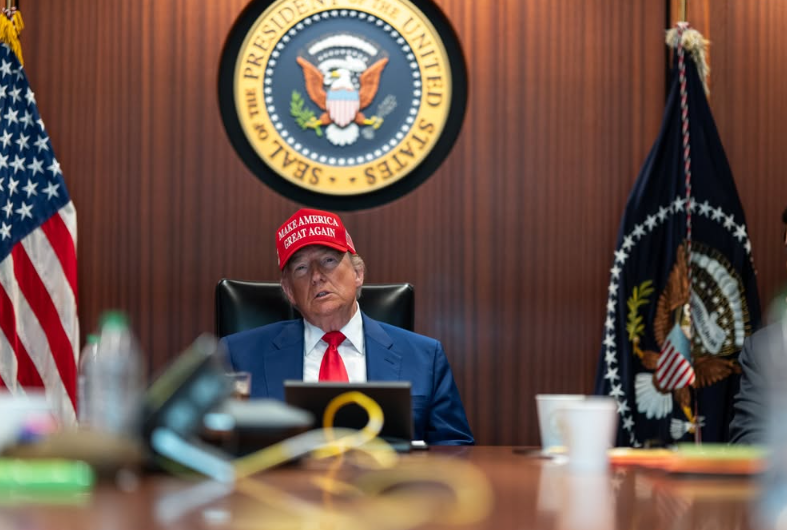The Fall of Academic Independence: How Columbia's Concession Signals a New Era for U.S. Higher Education
Input
Modified
In halls once proud with protest chants, Now silence sits with folded hands. When knowledge bends to power's will, The beacon dims, the air grows still.
In a dramatic shift that has sent ripples across the landscape of American higher education, Columbia University has settled with the federal government, which some see as a capitulation. The move comes amid escalating tensions between elite academic institutions and the administration of former President Donald Trump, whose second term has revived old cultural clashes around academic freedom, government funding, and institutional independence.
While Harvard University remains in open contention with the federal government, Columbia’s decision to comply with demands marks a critical turning point. The symbolic meaning is potent. If Columbia, long considered one of the standard bearers of intellectual autonomy and liberal values, is willing to concede, what future is left for academic resistance in the United States?
Many are beginning to ask whether the nation’s universities can still claim the moral prestige they have enjoyed since the time of Oxford’s founding centuries ago. With political interference reshaping priorities and funding increasingly tied to ideological conformity, the identity of American higher education stands at a crossroads.

Columbia’s Deal and the Message It Sends
Columbia's settlement with the Trump administration did not come out of nowhere. Under scrutiny for its handling of campus protests, diversity funding allocations, and faculty hiring practices, the university faced mounting legal and financial pressure. Rather than continuing to challenge the administration in court or publicly, Columbia chose to settle, agreeing to restructure several of its programs and to align its hiring and grantmaking practices more closely with new federal guidelines.
For the administration, the deal was framed as a victory for fairness and academic neutrality. But critics view it as a surrender. Columbia, they argue, did not just back down; it endorsed a new framework in which academic freedom must yield to political convenience.
The decision reverberates far beyond the university itself. It sets a precedent that other institutions, especially those dependent on federal funding, may feel compelled to follow. And in doing so, it marks a shift in how universities will be perceived, no longer as bastions of fearless inquiry, but as entities that must negotiate survival within the terms set by the state.
Unlike Harvard, which has chosen to fight back, Columbia’s route signals a pragmatic, albeit costly, adaptation. Harvard may still carry the banner of resistance for now, but if more institutions opt for compliance, the symbolic weight of that resistance may diminish.
The consequences will not be limited to Ivy League schools. Columbia’s actions may embolden regulators to pressure smaller universities and even private colleges that lack the political clout or financial endowments to push back.
A Warning to Nonprofits, a Threat to For-Profit Institutions
One of the most alarming aspects of this episode is what it implies for institutions outside the traditional nonprofit model. Universities like Columbia, despite their prestige, operate as nonprofit entities with some structural protection from direct political control. These institutions often gain moral credibility when they resist political influence, and historically, they have weathered storms through this perceived integrity.
But suppose Columbia, a symbol of academic resilience, has chosen self-preservation over confrontation. What hope is there for for-profit institutions or corporations that depend on goodwill from federal agencies? These entities operate in a more vulnerable space. Their missions are typically tied to market logic rather than moral leadership. Resistance, for them, is rarely an option.
For-profit colleges, in particular, could face crushing consequences if similar scrutiny is directed at them. Unlike universities with endowments and a legacy of elite protection, these institutions rely on tuition and federal grants to survive. Any hint of opposition to federal policy could result in defunding, accreditation challenges, or reputational damage that they simply cannot afford.
This dynamic opens a dangerous path. It blurs the line between government oversight and coercion, transforming compliance into the cost of existence. It also erodes public trust in the independence of higher education. If institutions are seen not as places of free inquiry but as arms of the state, the appeal and authority they once held will rapidly decline.
Moreover, there is growing concern about how federal influence will shape the future of academic staffing. Speculation is rising that professors perceived as politically problematic or aligned with minority or marginalized communities may be deprioritized for federal funding. Whispers have emerged that Jewish professors, in particular, may face challenges in securing grants, regardless of the academic merit of their proposals.
This unspoken shift toward ideological litmus tests is not only dangerous to scholarship but also to democracy itself. When intellectual merit takes a backseat to political acceptability, the quality and integrity of research inevitably suffer.

Eroding Legitimacy and the End of the Beacon
The implications of Columbia's settlement are profound, not just for university governance but for America's global reputation. For decades, U.S. universities were seen as beacons of intellectual freedom. They attracted scholars from around the world, established research standards, and produced graduates who went on to become global leaders. This prestige was not just about rankings or resources. It was about values.
Today, that reputation is in jeopardy. With political polarization spilling into academia and institutions abandoning their traditional roles as checks on authority, the image of the American university is transforming. No longer universally admired, these institutions are increasingly viewed with suspicion, either as captured by government interests or as impotent in defending their autonomy.
This loss of stature is not easily reversible. It affects international enrollment, faculty recruitment, and partnerships with global research institutions. Students from abroad, once eager to study in the U.S., may begin looking elsewhere. Talented scholars might think twice before joining American faculties, especially if funding and tenure become politicized.
There is also a chilling effect at home. Young academics may choose safer, less controversial areas of study. Students may avoid engaging in activism or challenging prevailing narratives for fear of institutional retaliation. The intellectual ecosystem that once thrived on open debate and fearless inquiry may wither under the weight of caution and conformity.
It would be a mistake to assume this is merely about one university or one administration. What we are witnessing is a broader transformation in how institutions define their responsibilities. When survival becomes the goal, ideals often fall by the wayside.
Still, hope has not vanished. Some institutions, like Harvard, continue the fight, and a critical mass of educators and students remains who value truth over comfort and courage over convenience. However, they are now operating in a landscape where precedent has been established, and the risks of resistance have increased.
Columbia’s decision may have been rooted in a desire to preserve itself. Still, in doing so, it may have contributed to the erosion of something far greater: the belief that universities stand apart from political tides, guided not by fear but by the pursuit of knowledge and justice.
What comes next will depend on whether other institutions choose to follow Columbia’s path or find the strength to chart a different course. The eyes of the academic world are watching, and the stakes have never been higher.






















Comment